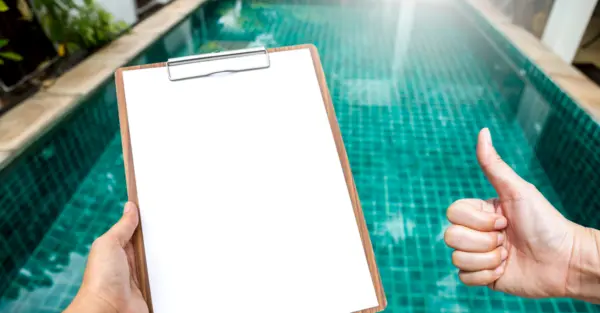
Dreaming of buying a home with a sparkling pool in Miami? While a pool can be an incredible addition to your South Florida lifestyle and boost your property value, it’s crucial to know exactly what you’re diving into. In this comprehensive guide, we’ll explore why a professional pool inspection is a must-have step in your home-buying journey.
Protecting your investment starts with understanding exactly what you’re purchasing. A professional inspection helps identify potential structural issues early, giving you insight into the condition of expensive equipment. This knowledge allows you to understand future maintenance costs and, if necessary, negotiate repairs with the seller before closing.
Safety compliance is another crucial aspect of pool ownership. Your inspector will verify all safety barrier requirements, check anti-entrapment systems, confirm proper electrical installations, and review the safety of features like diving boards and slides.
The evaluation of equipment condition is thorough and comprehensive. Your inspector will test the pool pump functionality, assess filter system efficiency, verify heater performance, check automatic cleaner operation, and examine chemical feeder systems to ensure everything is working as it should.
A comprehensive structural inspection examines the pool shell condition, evaluates deck and coping integrity, and includes a detailed tile and grout examination. Your inspector will assess any cracks and evaluate water level maintenance, providing insights into the overall structural health of your pool.
The mechanical inspection focuses on the heart of your pool’s operations. This includes thorough pump operation and efficiency testing, filter system performance evaluation, heater functionality checks, plumbing condition assessment, and verification of all electrical connections.
Your inspector will ensure your pool meets all safety requirements by examining barrier compliance, testing gate latches and closures, inspecting drain covers, checking emergency shut-off switches, and confirming the presence and condition of all required safety equipment.
Pool structures can develop various issues over time. Inspectors commonly find surface cracks that need attention, leaking joints that require repair, deteriorating plaster that needs resurfacing, loose tiles that pose safety risks, and deck settlement that can affect the pool’s integrity.
Mechanical systems often reveal age-related issues. Your inspector might discover aging pump motors that need replacement, clogged filters affecting water quality, inefficient heaters driving up energy costs, leaking plumbing requiring repair, or faulty electrical systems that need immediate attention.
Preparing for your inspection begins with researching qualified inspectors in your area. Take time to gather any available pool documentation from the current owner. Prepare specific questions about the pool’s condition and maintenance history. Schedule the inspection during daylight hours for the most thorough examination.
The inspection process involves comprehensive equipment testing of all systems. Your inspector will conduct a detailed water quality analysis, examine the structure for any issues, verify all safety features meet current codes, and evaluate the overall operation of the pool systems.
Following the inspection, you’ll receive a detailed written report outlining all findings. This includes specific maintenance recommendations and safety upgrade suggestions. This information becomes a valuable tool for understanding your potential investment and planning for future care.
Since 1985, Alligator Pools has been Miami-Dade County’s most trusted pool company. As a licensed pool/spa service contractor, our experienced team brings decades of hands-on pool maintenance and repair expertise to every inspection. We understand South Florida’s unique pool requirements and challenges from years of servicing pools throughout the Miami area.
Our thorough inspection services include: